Unit 1 Playing Sports Topic 1 I'm going to play basketball. 复习课件(共25张PPT,无音频)
文档属性
| 名称 | Unit 1 Playing Sports Topic 1 I'm going to play basketball. 复习课件(共25张PPT,无音频) | 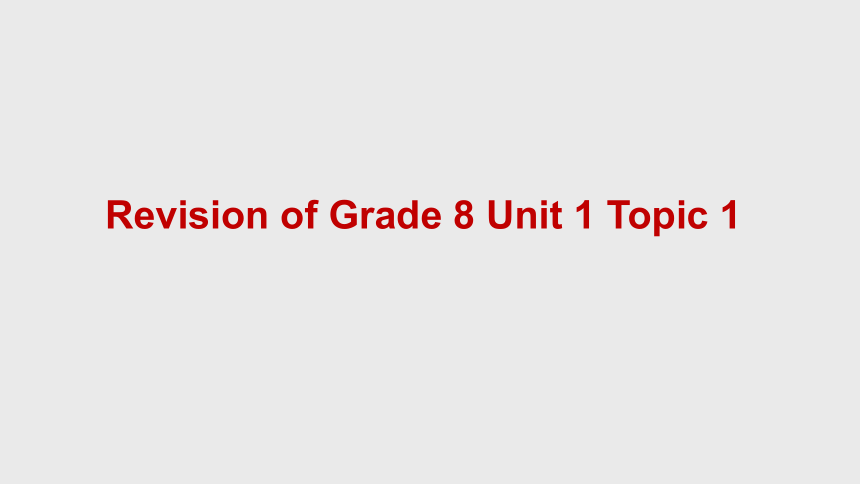 | |
| 格式 | zip | ||
| 文件大小 | 845.0KB | ||
| 资源类型 | 教案 | ||
| 版本资源 | 仁爱科普版 | ||
| 科目 | 英语 | ||
| 更新时间 | 2021-01-06 10:49:02 | ||
图片预览


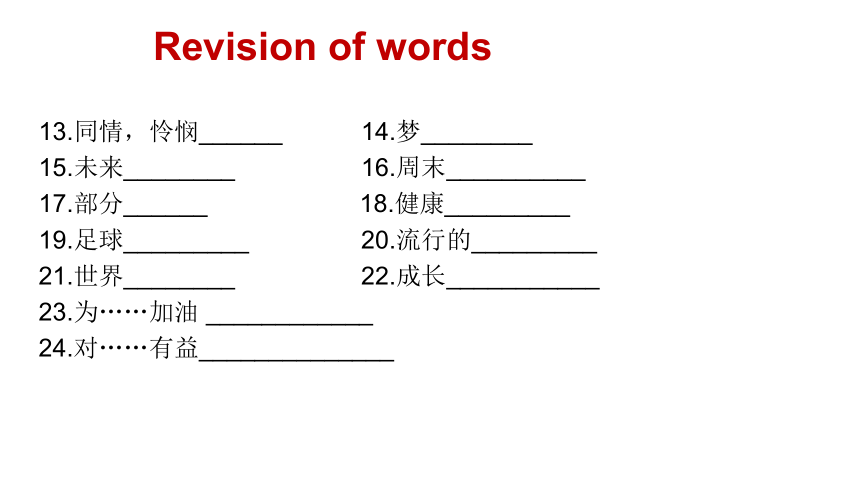
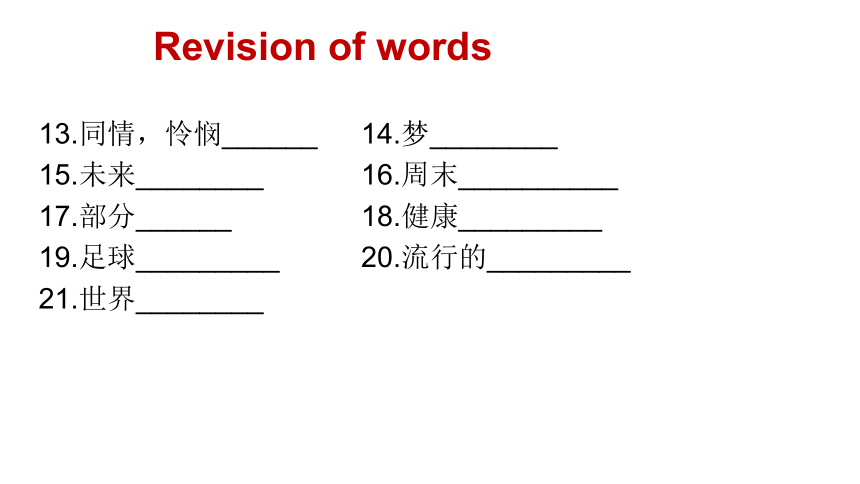
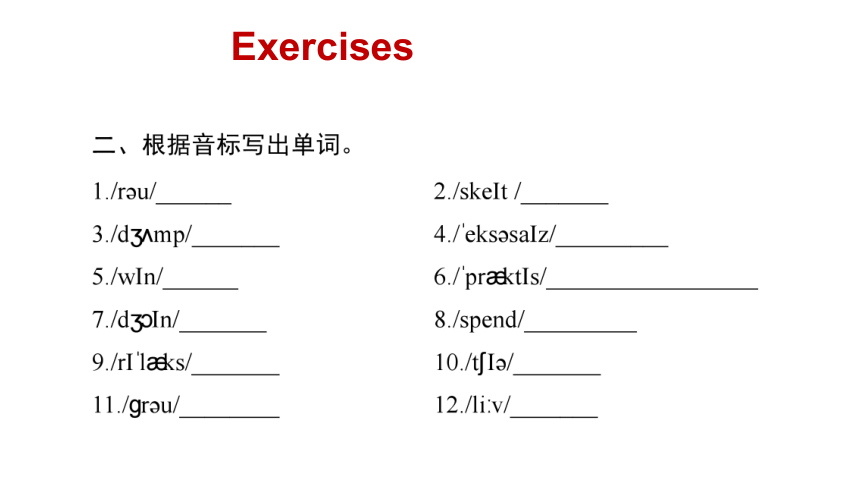
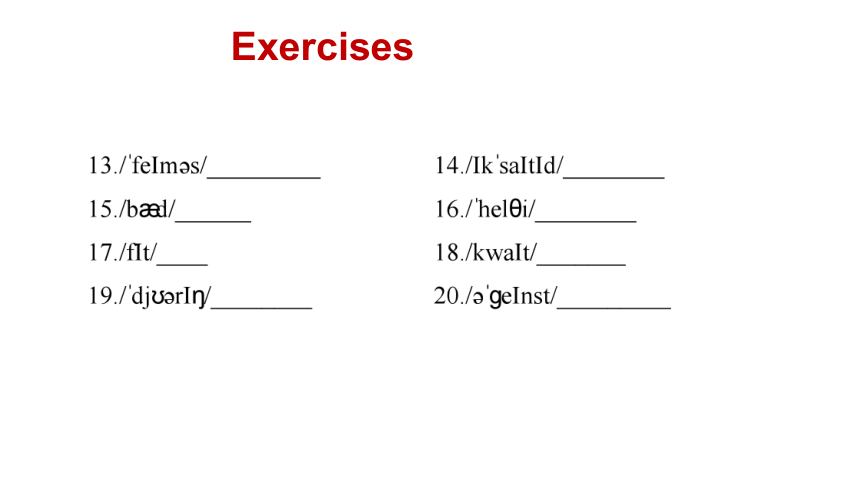
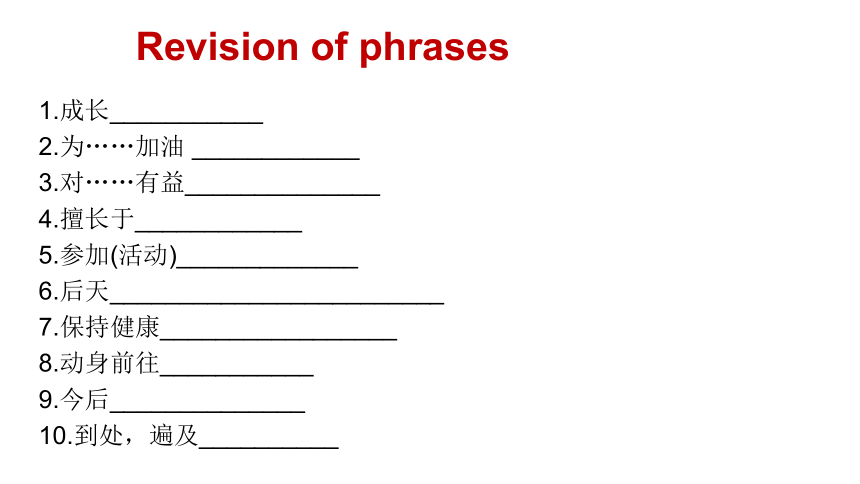
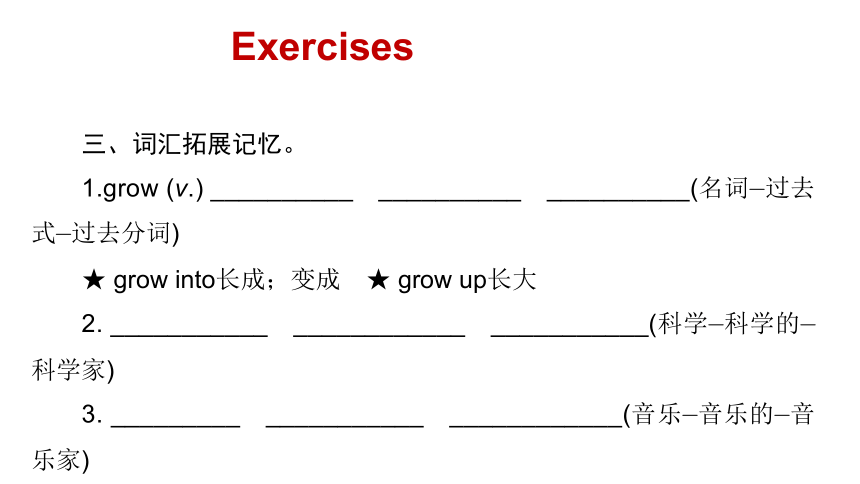
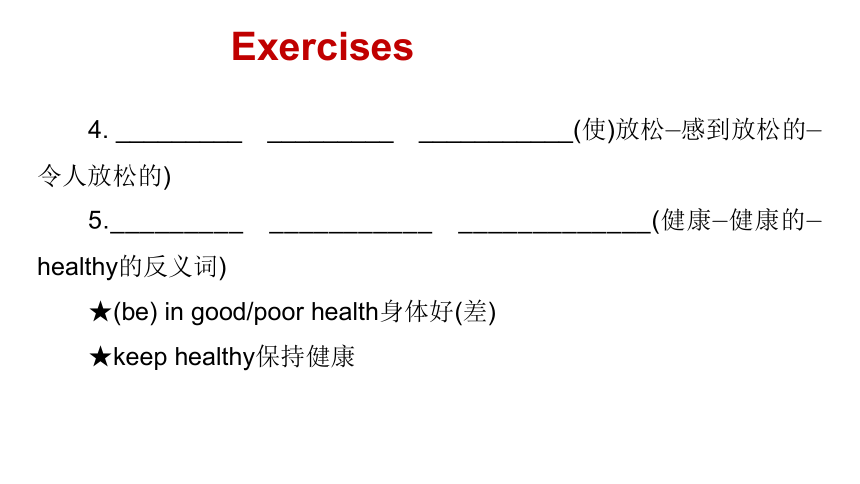
文档简介
(共25张PPT,无音频)
Revision
of
Grade
8
Unit
1
Topic
1
Revision
of
words
一、根据汉语意思写出单词、短语。
1.运动员________
2.科学家__________
3.音乐家__________
4.飞行员_______
5.警察____________
6.女警察______________
7.邮递员__________
8.渔夫____________
9.网球_________
10.棒球___________
11.队,组________
12.心脏________
Revision
of
words
13.同情,怜悯______
14.梦________
15.未来________
16.周末__________
17.部分______
18.健康_________
19.足球_________
20.流行的_________
21.世界________
22.成长___________
23.为……加油
____________
24.对……有益______________
Revision
of
words
13.同情,怜悯______
14.梦________
15.未来________
16.周末__________
17.部分______
18.健康_________
19.足球_________
20.流行的_________
21.世界________
Exercises
Exercises
Revision
of
phrases
1.成长___________
2.为……加油
____________
3.对……有益______________
4.擅长于____________
5.参加(活动)_____________
6.后天________________________
7.保持健康_________________
8.动身前往___________
9.今后______________
10.到处,遍及__________
Exercises
三、词汇拓展记忆。
1.grow
(v.)
__________ __________ __________(名词—过去式—过去分词)
★
grow
into长成;变成 ★
grow
up长大
2.
___________ ____________ ___________(科学—科学的—科学家)
3.
_________ ___________ ____________(音乐—音乐的—音乐家)
Exercises
4.
_________ _________ ___________(使)放松—感到放松的—令人放松的)
5._________ ___________ _____________(健康—健康的—healthy的反义词)
★(be)
in
good/poor
health身体好(差)
★keep
healthy保持健康
Revision
of
sentences
1.——你今天下午打算做什么?——我打算去打篮球。
—What
_______________________
this
afternoon?
—I'm
going
to
play
basketball.
2.我希望我们的队会赢(得比赛)。
I
_________
our
team
________
_______.
Revision
of
sentences
3.——你愿意来为我们加油吗?——当然,我很乐意去。
—_________
you
__________
come
and
cheer
us
on?
—Sure,
______
________
______.
4.——游泳和划船,你更喜欢哪一项运动?——我更喜欢划船。
—_________
sport
do
you
_________,
swimming
______
rowing?
—I
_________
rowing.
Key
points
1.exercise
v.
&
n.锻炼;运动
The
mind
needs
exercise
as
well
as
the
body.
大脑和人体一样需要锻炼。
①My
friend
Li
Ping
______
every
day,so
she's
more
athletic
than
me.
A.exercise
B.exercises
C.take
exercise
②Do
you
often
do
_______
____________(眼保健操)at
school?
不及物动词
运动
I
don't
exercise
enough.
及物动词
使……得到锻炼
We
should
exercise
our
eyes.
不可数名词
锻炼;运动
He
takes
exercise
in
the
morning.
可数名词
操练;练习题
Doing
eye
exercises
is
good
for
our
eyes.
Key
points
2.win
v.赢;获胜
______
_____
________(过去式—过去分词—名词)
France
won
the
21st
FIFA
World
Cup
in
Russia.
法国赢得了在俄罗斯举行的第21届世界杯足球赛。
①Who's
the
__________(win)of
the
school
chess
competition?
②—Our
team
______
the
match.We've
got
the
first
place!
—Well
done!Congratulations!
A.hit B.beat C.won D.watched
(1)
_____后接比赛(game,match)、奖品(prize)或战争(war)作宾语;
(2)
_____后接对手(人或团队)作宾语;
(3)win和beat的反义词为lose,其常用搭配为:lose
to
sb.。
Key
points
3.be
good
at(擅长于),be
good
for(对……有益处)
Going
to
school
without
breakfast
is
not
good
for
children's
health.
不吃早餐就去上学对儿童的健康不利。
①The
Uyghur
people
are
good
______
singing
and
dancing.
A.on B.at C.for
②Scientists
think
singing
_____
________
______
our
health.
Key
points
3.辨析be
good
at,be
good
for
be
good
at
擅长于做某事,同义短语为do
well
in;反义短语为be
poor/bad
in“在某方面弱(做得不好)”;
I'm
good
at
math
but
Kate
is
good
at
English.
be
good
for
对……有用(有益处);反义短语为be
bad
for“对……有害”;
Planting
more
trees
is
good
for
the
environment.
Key
points
4.join
v.加入,参加
She
joined
the
company
three
months
ago.
她三个月前进了这家公司。
①Students
in
this
school
are
encouraged
to
______
different
clubs
they
like.
A.join
in
B.take
part
in
C.join
②It's
his
first
time
to
______
a
food
festival.
A.join
in
B.take
part
in
C.join
③Adults
like
__________
______
the
talk
on
the
present
situation.
辨析join,
join
in,take
part
in
join
参加并成为某个组织或集体的一员
I'm
going
to
join
the
school
cycling
team.
join
in
参加小规模的活动,如球赛、游戏等;
She
listens
but
she
never
joins
in.
take
part
in
参加某项活动或比赛项目,并在其中起作用。
I
took
part
in
the
boys'800?meter
race
last
week.
Revision
of
grammar
be
going
to
【要点1】 be
going
to的用法:(1)
表示“打算”或“准备”做某事;(2)
表示按计划或安排将要发生某事;(3)表示预言某事即将发生。如:
We
are
going
to
play
basketball
tomorrow
afternoon.
The
meeting
is
going
to
begin
at
ten.
I'm
afraid
they
are
going
to
lose
the
game.
Revision
of
grammar
【要点2】 be
going
to
用于there
be
句型时,构成“There
is/are
going
to
be”结构,意为“将会有……”。
如:
There
is
going
to
be
a
school
food
festival
this
weekend.
There
are
going
to
be
several
concerts
in
the
town
hall
next
week.
【要点3】 表示位置移动的词,如go,come,start,move,leave,arrive,fly等一般不与be
going
to连用,而多用“be+doing”的形式表示将要发生的动作。如:
We
are
arriving
in
London
next
week.
Revision
of
grammar
【要点4】 在表示将来情况时,will和be
going
to在很多情况下可以互换,但在表示“准备、打算”时多用be
going
to,而和下面这些词(加下划线部分)同时使用时,多使用will。如:
I'll
__________
be
home
late
this
evening.
I
________she'll
phone
this
afternoon.
I
_______
she
will
come.
I
_________
what
will
happen.
Exercises
1.
—Mike,you
look
so
excited!
—Yeah!There
______
a
tennis
game
played
by
Li
Na
this
evening.
A.will
have
B.is
going
to
be
C.is
going
to
have
D.are
going
to
be
【解析】选B。本题考查there
be句型的一般将来时。句中有两个be动词,因为主语是单数,故be
going
to中的be用单数形式is,后一个be动词因为在be
going
to之后,故用动词原形。
Exercises
2.
Neither
the
headmaster
nor
the
teachers
______
take
a
vacation
next
week.
A.were
going
to
B.is
going
to
C.was
going
to
D.are
going
to
【解析】选D。本题考查be
going
to的用法。根据时间状语next
week可知,应使用一般将来时;又因为neither...nor...连接两个主语时,必须根据就近原则决定谓语动词的数,故选D。
Exit
Revision
of
Grade
8
Unit
1
Topic
1
Revision
of
words
一、根据汉语意思写出单词、短语。
1.运动员________
2.科学家__________
3.音乐家__________
4.飞行员_______
5.警察____________
6.女警察______________
7.邮递员__________
8.渔夫____________
9.网球_________
10.棒球___________
11.队,组________
12.心脏________
Revision
of
words
13.同情,怜悯______
14.梦________
15.未来________
16.周末__________
17.部分______
18.健康_________
19.足球_________
20.流行的_________
21.世界________
22.成长___________
23.为……加油
____________
24.对……有益______________
Revision
of
words
13.同情,怜悯______
14.梦________
15.未来________
16.周末__________
17.部分______
18.健康_________
19.足球_________
20.流行的_________
21.世界________
Exercises
Exercises
Revision
of
phrases
1.成长___________
2.为……加油
____________
3.对……有益______________
4.擅长于____________
5.参加(活动)_____________
6.后天________________________
7.保持健康_________________
8.动身前往___________
9.今后______________
10.到处,遍及__________
Exercises
三、词汇拓展记忆。
1.grow
(v.)
__________ __________ __________(名词—过去式—过去分词)
★
grow
into长成;变成 ★
grow
up长大
2.
___________ ____________ ___________(科学—科学的—科学家)
3.
_________ ___________ ____________(音乐—音乐的—音乐家)
Exercises
4.
_________ _________ ___________(使)放松—感到放松的—令人放松的)
5._________ ___________ _____________(健康—健康的—healthy的反义词)
★(be)
in
good/poor
health身体好(差)
★keep
healthy保持健康
Revision
of
sentences
1.——你今天下午打算做什么?——我打算去打篮球。
—What
_______________________
this
afternoon?
—I'm
going
to
play
basketball.
2.我希望我们的队会赢(得比赛)。
I
_________
our
team
________
_______.
Revision
of
sentences
3.——你愿意来为我们加油吗?——当然,我很乐意去。
—_________
you
__________
come
and
cheer
us
on?
—Sure,
______
________
______.
4.——游泳和划船,你更喜欢哪一项运动?——我更喜欢划船。
—_________
sport
do
you
_________,
swimming
______
rowing?
—I
_________
rowing.
Key
points
1.exercise
v.
&
n.锻炼;运动
The
mind
needs
exercise
as
well
as
the
body.
大脑和人体一样需要锻炼。
①My
friend
Li
Ping
______
every
day,so
she's
more
athletic
than
me.
A.exercise
B.exercises
C.take
exercise
②Do
you
often
do
_______
____________(眼保健操)at
school?
不及物动词
运动
I
don't
exercise
enough.
及物动词
使……得到锻炼
We
should
exercise
our
eyes.
不可数名词
锻炼;运动
He
takes
exercise
in
the
morning.
可数名词
操练;练习题
Doing
eye
exercises
is
good
for
our
eyes.
Key
points
2.win
v.赢;获胜
______
_____
________(过去式—过去分词—名词)
France
won
the
21st
FIFA
World
Cup
in
Russia.
法国赢得了在俄罗斯举行的第21届世界杯足球赛。
①Who's
the
__________(win)of
the
school
chess
competition?
②—Our
team
______
the
match.We've
got
the
first
place!
—Well
done!Congratulations!
A.hit B.beat C.won D.watched
(1)
_____后接比赛(game,match)、奖品(prize)或战争(war)作宾语;
(2)
_____后接对手(人或团队)作宾语;
(3)win和beat的反义词为lose,其常用搭配为:lose
to
sb.。
Key
points
3.be
good
at(擅长于),be
good
for(对……有益处)
Going
to
school
without
breakfast
is
not
good
for
children's
health.
不吃早餐就去上学对儿童的健康不利。
①The
Uyghur
people
are
good
______
singing
and
dancing.
A.on B.at C.for
②Scientists
think
singing
_____
________
______
our
health.
Key
points
3.辨析be
good
at,be
good
for
be
good
at
擅长于做某事,同义短语为do
well
in;反义短语为be
poor/bad
in“在某方面弱(做得不好)”;
I'm
good
at
math
but
Kate
is
good
at
English.
be
good
for
对……有用(有益处);反义短语为be
bad
for“对……有害”;
Planting
more
trees
is
good
for
the
environment.
Key
points
4.join
v.加入,参加
She
joined
the
company
three
months
ago.
她三个月前进了这家公司。
①Students
in
this
school
are
encouraged
to
______
different
clubs
they
like.
A.join
in
B.take
part
in
C.join
②It's
his
first
time
to
______
a
food
festival.
A.join
in
B.take
part
in
C.join
③Adults
like
__________
______
the
talk
on
the
present
situation.
辨析join,
join
in,take
part
in
join
参加并成为某个组织或集体的一员
I'm
going
to
join
the
school
cycling
team.
join
in
参加小规模的活动,如球赛、游戏等;
She
listens
but
she
never
joins
in.
take
part
in
参加某项活动或比赛项目,并在其中起作用。
I
took
part
in
the
boys'800?meter
race
last
week.
Revision
of
grammar
be
going
to
【要点1】 be
going
to的用法:(1)
表示“打算”或“准备”做某事;(2)
表示按计划或安排将要发生某事;(3)表示预言某事即将发生。如:
We
are
going
to
play
basketball
tomorrow
afternoon.
The
meeting
is
going
to
begin
at
ten.
I'm
afraid
they
are
going
to
lose
the
game.
Revision
of
grammar
【要点2】 be
going
to
用于there
be
句型时,构成“There
is/are
going
to
be”结构,意为“将会有……”。
如:
There
is
going
to
be
a
school
food
festival
this
weekend.
There
are
going
to
be
several
concerts
in
the
town
hall
next
week.
【要点3】 表示位置移动的词,如go,come,start,move,leave,arrive,fly等一般不与be
going
to连用,而多用“be+doing”的形式表示将要发生的动作。如:
We
are
arriving
in
London
next
week.
Revision
of
grammar
【要点4】 在表示将来情况时,will和be
going
to在很多情况下可以互换,但在表示“准备、打算”时多用be
going
to,而和下面这些词(加下划线部分)同时使用时,多使用will。如:
I'll
__________
be
home
late
this
evening.
I
________she'll
phone
this
afternoon.
I
_______
she
will
come.
I
_________
what
will
happen.
Exercises
1.
—Mike,you
look
so
excited!
—Yeah!There
______
a
tennis
game
played
by
Li
Na
this
evening.
A.will
have
B.is
going
to
be
C.is
going
to
have
D.are
going
to
be
【解析】选B。本题考查there
be句型的一般将来时。句中有两个be动词,因为主语是单数,故be
going
to中的be用单数形式is,后一个be动词因为在be
going
to之后,故用动词原形。
Exercises
2.
Neither
the
headmaster
nor
the
teachers
______
take
a
vacation
next
week.
A.were
going
to
B.is
going
to
C.was
going
to
D.are
going
to
【解析】选D。本题考查be
going
to的用法。根据时间状语next
week可知,应使用一般将来时;又因为neither...nor...连接两个主语时,必须根据就近原则决定谓语动词的数,故选D。
Exit
同课章节目录
- Unit 1 Playing Sports
- Topic 1 I'm going to play basketball.
- Topic 2 I'll kick you the ball again.
- Topic 3 The school sports meet is coming.
- Unit 2 Keeping Healthy
- Topic 1 You should brush your teeth twice a day.
- Topic 2 I must ask him to give up smoking.
- Topic 3 Must we exercise to prevent the flu?
- Unit 3 Our Hobbies
- Topic 1 What's your hobby?
- Topic 2 What sweet music!
- Topic 3 What were you doing at this time yesterday
- Unit 4 Our World
- Topic 1 What's the strongest animal on the farm?
- Topic 2 How can we protect ourselves from the eart
- Topic 3 The Internet makes the world smaller.
